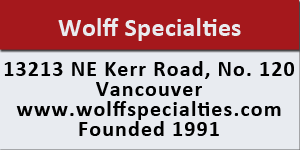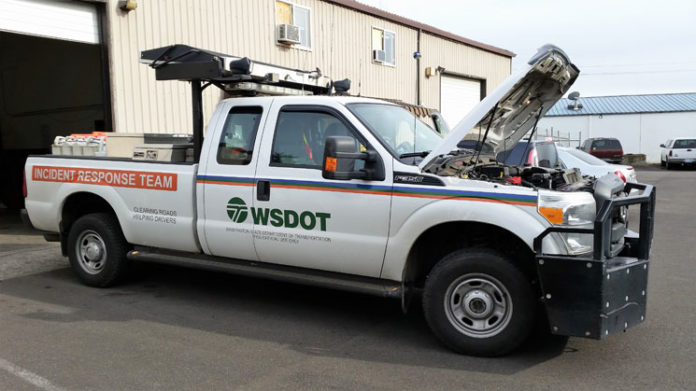Hybrid electric/gasoline-powered cars get a lot of hype these days, but there is another type of hybrid vehicle (also known as a bi-fuel vehicle) that runs on gasoline and autogas. Autogas is sometimes known as liquefied petroleum gas (LPG) or just simply propane. But according to Penny Wolff, who co-owns Wolff Specialties with her husband Dan, “autogas” is the accepted term in the automotive industry.
Wolff Specialties has been converting vehicles to autogas since the 1990s, and Dan’s experience in the field goes back even further than that – he completed his first conversion when he was 15 years old while attending high school in Medford, worked on Portland’s school bus conversion project in the 1980s, and worked for Ferrellgas in Portland for several years before buying out their conversion business and moving to Vancouver.
Due to its economic and environmental benefits, the autogas industry is expanding, and Wolff Specialties is growing accordingly. Four years ago the firm’s shop space was only 1,000 square feet. Now the business occupies a 3,000-square-foot automotive repair and conversion center in Orchards.
Over the last two and half years, Wolff has converted 100 Washington State Department of Transportation (WSDOT) vehicles, and is laying the groundwork for future expansion by increasing his company’s presence at conferences such as the Green Transportation Summit and Event and regional fleet manager meetings.
“We’re grooming people so that when they’re ready to move forward, they know that we’re here and what we have to offer,” stated Penny.
The firm focuses on the conversion of fleet vehicles (medium- to light-duty work trucks), such as those owned by school districts, municipalities and counties. Besides WSDOT, other regional customers include the Clark County PUD, United Fire Health and Safety and McMinnville Gas.
As the only ICOM North America (a major supplier of autogas conversion systems) dealer in Washington and Oregon, along with certification in all available autogas conversion equipment (there are several other types besides ICOM’s), Wolff Specialties is unique in the industry. In fact, Wolff serves as an installer for a local competing conversion company.
“We all need to be friendly with each other if we want the industry to take off and promote autogas,” Penny asserted.
Beyond the conversion process, Wolff Specialties also offers parts and maintenance services, as well as on-site training for customers. For example, said Penny, Wolff often attends customers’ safety meetings and provides advice on how to properly fill propane tanks and other safety topics. The firm also offers technical training to customers’ technicians to explain how the bi-fuel system works, teach them how to perform some diagnostics and maintenance, and answer questions. If a customer wants to perform their own conversions going forward, Wolff can take them through an installation certification program.
“We’re a one-stop shop,” said Penny.
Expertise is not the firm’s only claim to fame. Customer service is also a major focus.
“Making sure our customers are delighted is our prime goal,” Penny said. “Our customers know they can pick up the phone and call us and we’ll walk them through the issues and provide a quick response.”
The autogas advantage
Autogas, according to the Wolffs, offers several benefits, both for a customer’s bottom line and for the environment. For example, a bi-fuel vehicle has an extended range, since it has two fuel tanks. Therefore, Penny explained, the vehicle can spend more time in the field, which can be extremely important during natural disasters such as landslides and flooding. In addition, unlike gasoline, autogas can be delivered right to the vehicle in the field. In-ground gasoline tanks can become contaminated, which is not a problem with autogas, and autogas doesn’t go bad (phase separation) like gasoline does.
 Moreover, Penny added, bi-fuel vehicles have a longer life expectancy than standard gasoline vehicles, since not as much carbon gets into the motor. A bi-fuel vehicle powered by autogas can go almost 10,000 miles between oil changes. Autogas costs about $1.35 per gallon, and tax credits exist than can provide rebates of up to $0.50 per gallon.
Moreover, Penny added, bi-fuel vehicles have a longer life expectancy than standard gasoline vehicles, since not as much carbon gets into the motor. A bi-fuel vehicle powered by autogas can go almost 10,000 miles between oil changes. Autogas costs about $1.35 per gallon, and tax credits exist than can provide rebates of up to $0.50 per gallon.
“WSDOT reports that a conversion pays for itself in two to two-and-a-half years through fuel savings,” said Penny.
An average conversion, she added, averages less than $10,000 and takes only two days to complete.
From the environmental perspective, autogas CO2 exhaust emissions are about 15 percent less than gasoline, and it is a readily accessible domestic fuel – 90 percent of all U.S. autogas is produced in the U.S.
“Autogas is good for our state,” Penny stated. “Whichever alternative fuel you choose – autogas, compressed natural gas (CNG) or electric – it’s going to be important in our future to start taking alternative fuel steps.”
The firm currently is run by Penny and her husband Dan, along with one other employee, but she has been working with WorkSource Vancouver and other agencies, getting ready to ask for assistance in looking through resumes and starting to do some interviews.
“We see the potential for huge growth in this next year,” said Penny.
For example, the City of Longview’s 2017/2018 budget includes a line item for conversion of 15 fleet units to autogas – Penny expects the city to publish an RFP soon – and Thurston County has been considering expanding their fleet and moving to bi-fuel.
“These projects sound exciting and I hope we win the bids,” Penny said. “Dan is unique for his lifetime experience in this industry and his versatility.”



